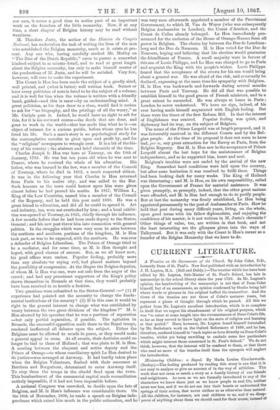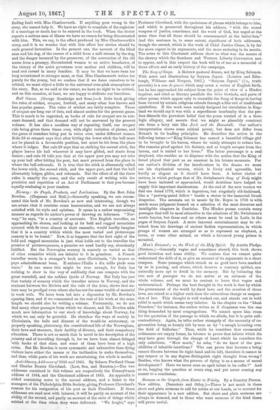Ministering Children: a Sequel. By Maria Louisa Charlesworth. (Seeley.)—The feeling
produced by reading this story is one that it is not easy to analyze or give an account of in the way of criticism. The work does not seem so much a story as a family history of our friends and neighbours. As soon as we are formally introduced to any of the characters we know them just as we know people in real life, neither more nor less, and if we do not see into their hearts or understand the springs of their action, that never strikes us as otherwise than natural. All the children, for instance, are real children to us, and if we disap- prove of anything about them we should send for their nurse, instead, of
finding fault with Miss Charlosworth. If anything goes wrong in the story, she cannot help it. We have no right to complain of the registrar if a marriage or death has to be entered in the book. When the doctor reports a serious case of illness we have no reason for being discontented with him. This, we say, is the effect produced by Miss Charlesworth's story, and it is no wonder that with this effect her stories 'should be such general favourites. In the present one, the account of the blind man and his dog, of the rescue of a child from a mill stream by the dog, and the danger incurred by the preserver, of the conversion of the old nurse from a grumpy, discontented woman to an active benefactor, of the victory of the quiet governess over mother and children, will be read and reread in many families. It may be that we have been too long accustomed to stronger meat, or that Miss Charlesworth writes too purely for the young, but we confess that if we force ourselves to be critical, we must object a little to the universal rose-pink atmosphere of the story. But, as we said at the outset, we have no right to be critical, and on this occasion, at least, we are happy to abdicate our functions.































 Previous page
Previous page